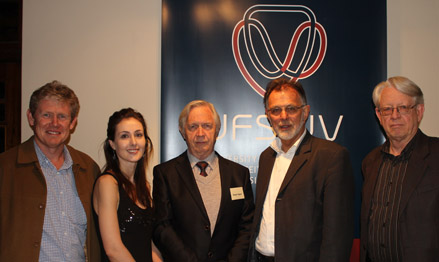Latest News Archive
Please select Category, Year, and then Month to display items
08 May 2024
|
Story Anthony Mthembu
|
Photo SUPPLIED
 From left to right: Prof Philippe Burger, Dean of the Faculty of Economic and Management Sciences (EMS) at the University of the Free State (UFS), presenting an award to Ntswaki Moshwaisi.
From left to right: Prof Philippe Burger, Dean of the Faculty of Economic and Management Sciences (EMS) at the University of the Free State (UFS), presenting an award to Ntswaki Moshwaisi.
A cohort of esteemed academic and support staff from the Faculty of Economic and Management Sciences (EMS) at the University of the Free State (UFS), received well-deserved accolades at the 2024 annual EMS Awards. Notable among them were Programme Coordinator Ntswaki Moshwaisi and Associate Professor Prof Liezel Massyn from the UFS Business School.
Prof Massyn was lauded in the Teaching and Learning category, while Moshwaisi garnered recognition in the Support Staff category at the awards ceremony held on 18 April 2024, on the UFS Bloemfontein campus.
Reflecting on her achievement, Moshwaisi expressed gratitude, stating, “The award serves as motivation to myself to keep working hard and to innovate methods and approaches towards my work.’’
The significance of the awards
Prof Massyn remarked that the awards serve to spotlight the remarkable contributions of both academics and support staff within the faculty. She considers the award as a testament to her dedication, acknowledged by her esteemed colleagues. Both Prof Massyn and Moshwaisi attribute their success to the support they receive from their peers.
Moreover, they emphasise that these awards transcend mere recognition. It will serve as an impetus to the way forward. Moshwaisi envisages leveraging her award to enhance the quality and efficacy of the programmes under her stewardship. Prof Massyn, echoing this statement, asserts, ’’It will strengthen my belief in the transformative power of teaching and make me work harder to provide quality learning opportunities to students. I am a firm believer in following an evidence-based approach and will continue to research learning and teaching.’’
Supplementum analyses the San origin of South African place names
2013-09-25
|
 |
|
At the launch were, from the left: Prof Lucius Botes (Dean: Faculty of the Humanities), Christine van Deventer (SUN MeDIA), Prof Peter Raper (author), Prof Theodorus du Plessis (Head of Department: Linguistics and Language Practice), and Prof Dirk van den Berg (outgoing editor).
Photo: Jerry Mokoroane
25 September 2013 |
The Acta Academica Supplementum 2012 (2), under the outgoing editorship of Prof Dirk van den Berg, was launched on 16 September 2013. The author, Prof Peter Raper, is one of the leading place-name experts in South Africa. The Supplementum analyses the San origin of South African place names whereby different layers of language contact are exposed. For example, Dipodi (previously Jakkalsdraai), is an adaptation of the original San name. The first ‘di’ is the added Sotho preposition. ‘Po’ is equal to the San word ‘po’ (jackal) and the last ‘di’ equal to ‘/gi’ (to bend). Prof Raper’s research indicates that many place names carry evidence of various language shifts. By analysing these language layers, different phases of language contact are exposed. This research is instrumental in the preservation of a unique aspect of the South African cultural heritage.
Prof Raper is since 2011 Honorary Professor: Linguistics, in the Department of Language Management and Language Practice at the University of the Free State. He is one of South Africa’s leading toponymists. The fourth edition of the New Dictionary of Southern African Place Names, with Dr Lucie Möller and Prof Theodorus du Plessis as co-editors, is currently in the press. He is a member of the Commission for Toponymy of the International Geographical Union, as well as the Working Group for Toponymy of the International Cartographic Association, of which there are only ten members worldwide, and a member of the Editorial Advisory Board for the journal Names.